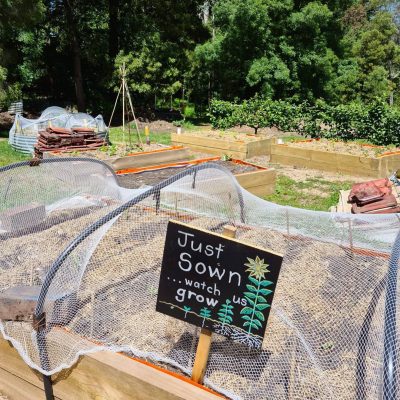Community gardens: Growing global citizens one child at a time

University of South Australia Media Release
It’s often said that ‘from little things, big things grow’. Now, research at the University of South Australia is showing that the simple act of gardening can deliver unique learning experiences for primary school children, helping them engage with their curriculum while also encouraging a sustainable future.
Partnering with teachers and primary school students in a weekly gardening project, researchers found that working in the garden had multiple learning benefits, from transdisciplinary learning, to fostering sustainability and global citizenship. In the Australian Curriculum, sustainability is described as a ‘cross curriculum priority’ indicative of the transdisciplinary nature of learning for sustainable and harmonious interaction with the environment.
Adjunct UniSA researcher, Dr David G. Lloyd, says it’s vital that children have opportunities to appreciate and connect with nature.
“Gardening can open a whole new world of interest and opportunity for children. Working in a community garden is not only about growing edible food; it’s also about connecting to place and nature, as well as grasping the importance of sustainability,” Dr Lloyd says.
“Community or school food gardens can help us to better understand the value of living locally and demonstrate how we can be more self-sufficient. They show us how to live with a lower carbon footprint, and how we can enjoy our connection to our natural world.
“In this project we found that primary-aged children can adopt sustainability principles simply by growing their own food, connecting with others, and respecting the environment. And at the same time, we showed that transdisciplinary learning can occur throughout the gardening experience.”
The project engaged Year 4 (aged 9-10 years) and Year 1 (aged 5-6 years) primary school students in a three-hour-a-week gardening activity, where they grew their own food in the Old School Community Garden in Stirling. Their gardening activities were also supplemented by school-based learning about the children’s ‘in-field’ experiences.
Co-researcher and UniSA Associate Professor Kathryn Paige, says the gardening project illustrates how out-of-the-box activities can incorporate the school curriculum.
“Finding different ways to engage students is an ongoing challenge for teachers. But when we find something that works on multiple levels – like gardening – it’s an activity that should be encouraged,” Assoc Prof Paige says.
“For example, in the community garden children learnt maths when they counted out plants and measured distances between seedlings; chemistry, when they tested the pH levels of soil and diluted liquid fertilisers; science and biology, when they discovered facts about plants and ecosystems; plus, literacy, when they read instructions and retold their experiences at school. They also improved their social skills as they engaged with their peers.
“The fundamental importance of this activity was holistic learning: connecting to the world around us, the community in which we live, and understanding how we all interact.
“We’re living in a time of globalisation, where we’re reaching social, environmental, and economic limits.
“By encouraging teachers to embrace immersive, whole-of-curriculum initiatives that connect education and sustainability principles, we’re positioning the younger generation up for success.”
Like what we do at The AIMN?
You’ll like it even more knowing that your donation will help us to keep up the good fight.
Chuck in a few bucks and see just how far it goes!
Your contribution to help with the running costs of this site will be gratefully accepted.
You can donate through PayPal or credit card via the button below, or donate via bank transfer: BSB: 062500; A/c no: 10495969










3 comments
Login here Register here-
leefe -
Canguro -
wam
Return to home pageShort of going bush for a few days (or weeks) there is nothing so regenerative as tending a garden and seeing the results of your work.
All my trees have set fruit (most are only two years old), the raspberries are giving me a punnet a day at least, the currants are ripening nicely, the strawberries are loaded down with big juicy fruit and no fewer than four shrubs have flowered for the first time – two of which have been nursed along for more than six years. The local birds, butterflies and native bees are loving it.
What’s in a name? leefe writes delightfully of her garden, as she would. And I once knew a horticulturist named Teresa Green, perfectly described for her profession.
Having just returned home after several thousands of kms road warrior jaunting between Melbourne, Adelaide and the far north NSW coast, my garden, too, beckons, work aplenty awaiting. I saw a sign yesterday, alongside a nursery, which said something like ‘When you are weary of the world and relationships disappoint, return to your garden and refresh and replenish your soul.’ I hear its call!
My children were lucky and unlucky at primary school. The secret to a garden is having a dedicated 7 days a week teacher(all those teachers were educated on the job and long gone).
Her ‘garden’ teacher was old fashioned and my daughter is dyslexic and had to spent half her lunch copying her ‘spelling mistakes’. When he retired so did the garden.
Have you tried to get your kids interested at home? ps
leefe, we are lucky to have a lime tree, mangoes, rambutans and a grafted mangosteen, easily the best cool fruit of all, sadly it no longer producing, as the fruit drops, at little more than cherry size, two huge coconut trees which look awesome in the moonlight, especially from the pool and. according to our arborist friend, the finest tamarind tree in darwin. We had a huge jackfruit tree, so well loved by our Asian friends, but it was killed by a fungus. My darling has some beautiful flowering plants, desert roses and a grass tree which she tends every day.